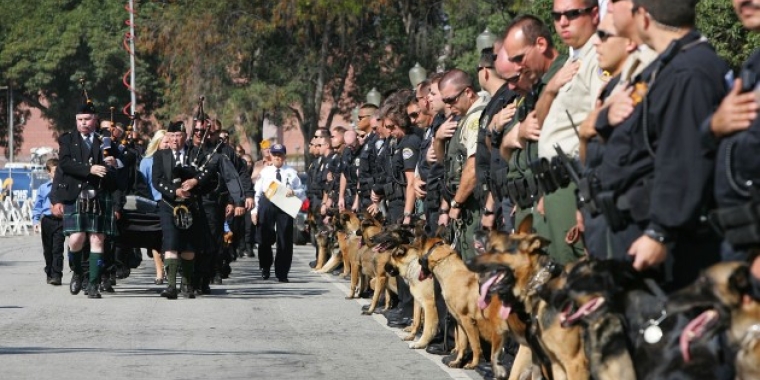
Bill to Increase Penalty for Killing Emergency Services Dogs Poised to Pass Senate
March 18, 2013

[Albany] - Senator Joseph A. Griffo (R-C-IP, Rome) joined several Senators this morning who said that the Senate will be voting on a bill this week that would increase the penalties for killing a police dog.
Currently, under New York State law, those who harm a police canine can only be charged with a Class A misdemeanor. This bill increases the penalties for killing or injuring a police animal by making it a Class D felony.
“As a former Mayor, who’s has seen the work firsthand of these highly trained, heroic animals, we should consider felony charges when they’re harmed,” said Griffo. “These dogs help protect the public and when you attack them, you’re a threat to law enforcement.”
Griffo is a co-sponsor of the bill, Senate # 1079 which would make it a felony to harm all law enforcement and emergency services canines. S.1079 has a companion bill in the Assembly sponsored by Assemblymember Kenneth Zebrowski.
In addition, under current law, a person is guilty of this crime when the animal is killed or injured while the animal is performing its duties. This bill expands the crime to include killing or injuring the animal when the animal can be identified as a police animal by means of its presence in a police vehicle or an emergency vehicle, or by its enclosure in a marked area.
While the bill has passed the Senate in previous years (including unanimous support last year – see below), last week’s shooting death of an FBI-canine, “Ape,” in Herkimer, has urged legislators to pass the bill once more. Griffo joined Senators in urging that the Assembly also take up the legislation for consideration.
POLICE DOG PROTECTION BILL HISTORY:
S.4701 of 1997/1998; Referred to Senate Codes Committee
S.4448 of 1999/2000; Referred to Senate Codes Committee
S.1901/A.1369 of 2001/2002; Referred to Senate Codes Committee
S.561/A.1615 of 2003/2004; Passed Senate
S.701-A/A.296-A 2005/2006; Passed Senate
253-A of 2007/2008; Passed Senate
S.1403 of 2009/2010; Referred to Senate Codes Committee
